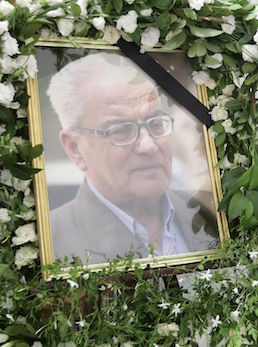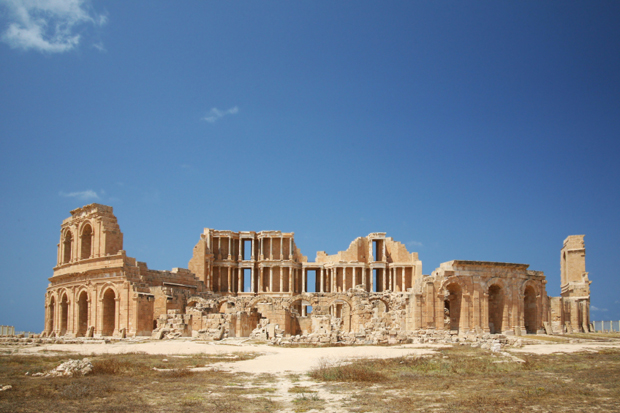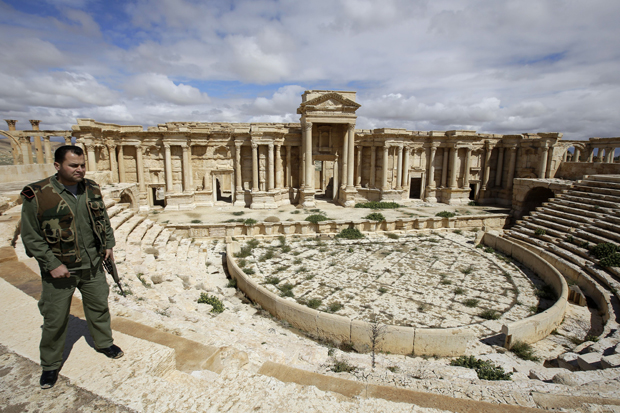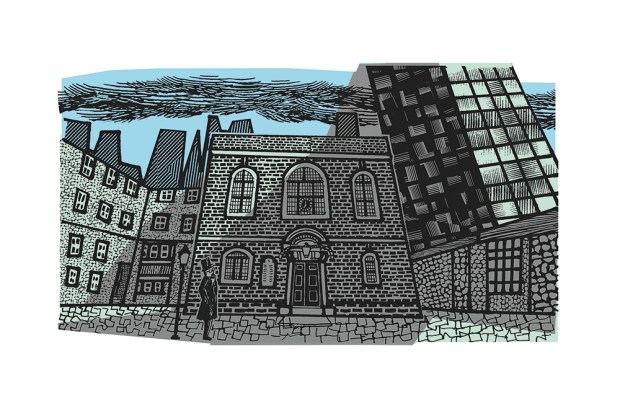Leptis Magna was deserted when I last visited — no wonder. Tourists daren’t visit Libya these days and so I had the ruins to myself. I climbed the steps of the vast Roman theatre, looked out to where the Wadi Lebda meets the sea, then stopped. Men with AK-47s. My immediate fear was that they were Islamic State. Isis move closer to Leptis Magna every day and it would make sense for this most spectacular site to be next on their hit list.
Their last great coup was on the other side of the Med, when they blew up the Temple of Baal Shamin in Palmyra, known as ‘the Pearl of the Desert’. It’s part of their cultural jihad, but they also do it for the global outrage that follows. No such thing as bad press for Isis.
As the gunmen approached, they looked less threatening and began to speak. They were, they explained, not Isis but a group of local volunteers protecting the site from the Islamist terrorists: Neighbourhood Watch, with Kalashnikovs.
That you need guns to protect ancient sites from Isis is a given. Look what they did to Khaled al-Asaad in Palmyra. The 82-year-old archaeologist, director of antiquities, refused to disclose the whereabouts of artefacts which had been moved for safekeeping. He was tortured and beheaded, and his headless corpse strung up with a placard saying ‘Director of Idolatry’.

Dr Asaad had been urged by family members, colleagues and friends to leave Palmyra after Isis took over. But he had been working at the sites for 45 years, discovering some of its most famous treasures including a trove from the Sassanid dynasty, which ruled from c. 200 to 600 ad, and he felt he had a duty to protect them.
I’ve been around the world reporting on Islamist atrocities, and for all the hand-wringing done by western politicians over the desecration of monuments, it seems to me that it’s the brave civilians who feel this duty most keenly.
All over the world, civilians are quietly doing their bit. I met Samir, a 24-year-old archaeology student and opposition activist from Damascus, who regularly crossed the border from Turkey into Syria to chart missing artefacts. He told me that the commanders of Isis and Jabhat al-Nusra (an al–Qaeda affiliate) were making money by selling off the most valuable antiquities. Samir was shot dead near Aleppo three months ago by a smuggling gang that works with the Islamists.
Two years ago jihadists who had overrun half of Mali began to burn ancient manuscripts in Timbuktu, and in response the residents took the most valuable scripts from the city’s Ahmed Baba Library and hid them in their homes.
After the Islamists were driven off by French forces, one man, Dramane Maulvi Haidara, showed me a book of Hadiths (sayings of the Prophet Mohammed) which he had managed to save. There were pages of exquisite calligraphy and fraying Moroccan leather covers from the 14th century.
‘We must now get these somewhere safe,’ he said, ‘because they will be back.’
Dramane was right. The Islamists are now back and carrying out renewed attacks, but Timbuktu’s most treasured historic manuscripts are, for the time being at least, safe in the capital, Bamako.

In fact the official West — its governments and armed forces — have a distinctly iffy track record on protecting our cultural heritage. In Baghdad in 2003, after the city’s ‘liberation’, American soldiers stood by as the National Museum and historic sites were looted. The Bush administration wanted it to appear that the action of the rampaging mob was a popular expression of rage against Saddam Hussein. These scenes were replicated in Mosul, Nineveh and Tikrit.
Though they won’t thank you for saying it, our own soldiers also took part in the destruction. US and Polish soldiers used Babylon as a military depot, causing severe damage. Attempts were made to gouge out the famous dragon carvings of the Ishtar Gate, and brickwork dating back 2,500 years was crushed by armoured vehicles. Invaluable archaeological fragments were used to fill sandbags and trenches were dug through the ruins.
John Curtis, the keeper of the British Museum’s Ancient Near East department, visited Babylon at the invitation of Iraqi colleagues and said what had happened was ‘tantamount to establishing a military camp around the Great Pyramid in Egypt or around Stonehenge in Britain’. The US countered that the looting at Babylon would have been worse had they not been there at all.
Now, in another country and another war, my friends among the Syrian rebels ask: why did the US-led coalition not do more to protect Palmyra? There were daily bulletins of the Isis advance on the city and warnings of the certain destruction of the Unesco world heritage site if they managed to capture it. But no air strikes took place to stop the jihadists. Even now, it is local people who are forming the resistance, with little or no official support.
It’s the same in Libya. The men I met at Leptis Magna, around a hundred of them, get no funding from the Tripoli Dawn government in the capital Tripoli, nor the rival government, recognised by Britain and the West, based in a hotel in Tobruk.
One of the Leptis Magna watchmen, Mohammed al-Shaqiri, said: ‘Why should there be any surprise that we will fight to save this place? Generations of our families grew up around here. Who are Daesh [Isis] to order us about our history?’
With no faith that either shakily established local governments or western forces and aid agencies will help, men like Dramane in Mali, Mohammed in Libya and Dr Asaad in Syria risk their lives to protect the treasures of the ancient world. If anything survives the cultural desecration of Isis, it is thanks to their quiet heroism. We in the West should be ashamed not to have done more to help them.
Got something to add? Join the discussion and comment below.
Get 10 issues for just $10
Subscribe to The Spectator Australia today for the next 10 magazine issues, plus full online access, for just $10.
Kim Sengupta is defence and diplomatic correspondent of the Independent.
You might disagree with half of it, but you’ll enjoy reading all of it. Try your first month for free, then just $2 a week for the remainder of your first year.














Comments
Don't miss out
Join the conversation with other Spectator Australia readers. Subscribe to leave a comment.
SUBSCRIBEAlready a subscriber? Log in